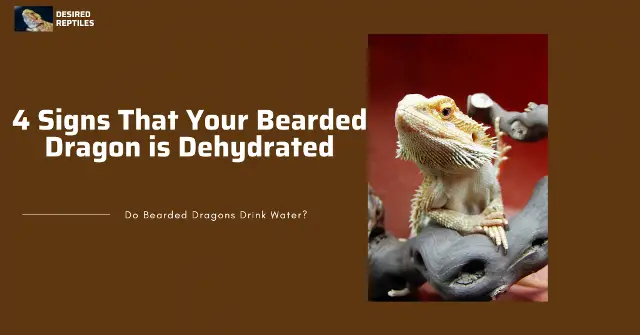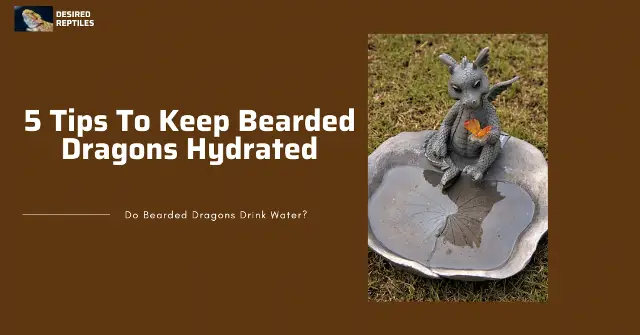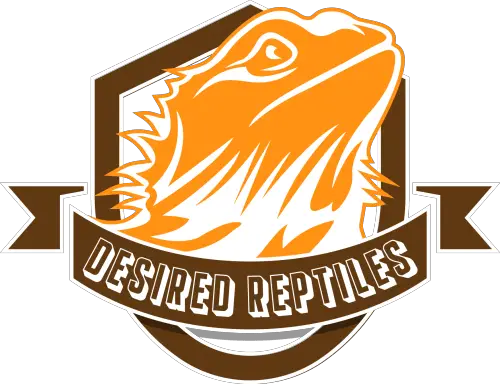You see, bearded dragons are semi-arid region dwellers that have little to no access to water yet they survive and repopulate in such conditions. They have evolved to make their lemonade out of little moisture, and are quite successful at it. If you’ve ever wondered whether beardies drink water, this discussion will provide all the answers you need!
Bearded dragons do drink water. They might require mere spoonfuls, but they need water to keep their guts moving nonetheless. The most fascinating thing about their drinking water is how they go about it; did you know that bearded dragons can absorb moisture through their thick scaly skin?
You may be wondering why your beardie doesn’t drink as much water as you expect or may be simply curious about the relationship between dragons and hydration. I’ll be going over all that to satisfy your curiosity and ensure your pet stays hydrated the proper way.

4 Tell-Tale Signs Your Bearded Dragon Is Dehydrated
It’s difficult to tell if beardies are dehydrated or not, and sometimes even impossible if you don’t know where to look. In case you have a suspicion, here’s how to tell if your pet is dehydrated:
1. Constipation
Dry, crumbly poop is the biggest “Help! I’m dehydrated!” sign your dragon can give you. Beardies are rarely constipated, and when they are, it simply means they are getting less water than they should.
2. Unusually Thick Saliva
If you suddenly notice that your beardie takes longer to swallow its food or it starts having strings of saliva across each jaw when it opens its mouth, it’s a sign to take hydration seriously.
3. Weird Droopy Eyelids
Dehydration is accompanied by weakness, so when you find that your dragon looks sleepy or is less alert than usual, the chances of dehydration are high. However, this symptom is associated with illnesses such as common flu, bone diseases, or eye infections.
4. Saggy Skin
When your dragon is in a docile position, perhaps perched on their basking spot, pinch and hold their skin. If it bounces back immediately after you let go, they’re properly hydrated. If not, and it takes a few seconds to get back into shape, you need to seriously consider a visit to the vet and proper hydration.
Bearded Dragon Water-Drinking Facts You Must Know
Beardies are sometimes misunderstood when it concerns their feeding habits. This is why it’s necessary to debunk the points surrounding drinking water to help you understand your pets better.
Baby Bearded Dragons Need More Water Than The Adults
If you have an idea of their feeding techniques, you’ll understand that baby beardies eat more in comparison to adults. Hatchlings and juveniles need to stay hydrated to encourage circulation and boost their growth– and they grow rapidly. They are also pretty active, and this sets them in high demand for moisture to stabilize their metabolism.
Adult Bearded Dragons Can Drink Water Once A Week
Adult beardies care less and less for food or water as they age and it’s not much of a different story with water. Bearded dragons in the wild can go days without regular hydration, and since they prey on smaller lizards, rodents, and even birds, they get a relative amount of moisture in comparison to beardies in captivity.
On average, an adult beardie may need just a teaspoonful of water in a day. Even at that, you might have to coax or trick them into drinking. Though they need water to survive, sometimes they just wouldn’t want to drink it.
So, if you find your pet engaging its water bowls less and less as it ages, worry not. It’s simply their nature to be less interested in water as they grow.
Water Bowls Can Affect The Humidity Of Your Bearded Dragon’s Enclosure
Everyone talks about water bowls and their mega importance in a bearded dragon’s life, and they’re correct in that thought. However, the dangers are usually ignored. See, beardies are accustomed to a particular level of humidity, and exceeding this mark puts them in the way of illnesses. This is exactly where water bowls bring in their cons; a water bowl in a terrarium skyrockets the humidity levels of that area to your dragon’s detriment.
Here’s the deal: bearded dragons need 30% to 40% of humidity. If you live in an already humid region, you will have to remove the water bowl to prevent your dragon from contracting respiratory infections. However, if you live in arid regions, you just might need to include the water dish to reach the ideal humidity. This is why it’s important to always have a hydrometer to pick on the little differences in moisture levels.

Effective Tips To Get Your Bearded Dragon Hydrated
It’s frustrating when you suspect that your arid-habitat little friend is dehydrated but still refuses to drink any water. Thankfully, I have a few tricks up my sleeve that worked perfectly to keep my dragon hydrated.
Throw A Worm Into The Water Bowl
Beardies cannot resist their delicious wriggling worms. All you have to do is throw a worm into their bowls, and they’d be licking away trying to fish it out. After a few worm tricks, you can be content knowing your dragon is fully hydrated.
Mist Their Heads
Using a spray bottle filled with fresh clean water, spatter a few spritzes on their heads so they can lick it off. This method is usually useful for humid areas as it wouldn’t need a water bowl at all. In fact, you can make this a daily routine for baby beardies after they feed.
Spray Their Veggies With Water
Misting veggies is another great way to hydrate your scaly friends and you can make it a routine to spritz their food now and then. This is more functional with adults since they eat more veggies than protein in comparison to baby dragons.
Soak Them In A Shallow Bowl
Beardies love to cool off in water, and you might have found them making a mini pool out of their water bowls with their little bellies dipped in it. This is because they can absorb water through their skin which makes it easy for them to stay moisturized during brumation. Once or twice a week, you can soak them in a shallow bowl for 15 minutes. As you do this, ensure that you don’t let the water exceed their ankles!
Caution: While they’re soaking, they might start to drink the water. Never pick them up during this process because they may choke. Beardies have valves in their throats that allow them to gulp water without choking or blocking air inflow and when you pick them up, you disrupt this feature and cause them to literally drown. Please, don’t touch your beardies when they’re drinking!
Feed Your Dragon Water Through A Syringe
This method should be a last resort when your beardie is too weak to drink, and it should be done with extreme care. Using a new syringe filled with clean water, gently pinch open the beardie’s mouth, and through the side, insert the syringe. Slowly and steadily empty the content making sure they don’t choke. Depending on the severity of your dragon’s dehydration, your veterinarian will instruct you on how frequently this should be done.
Possible Reasons Behind Your Bearded Dragon’s Dehydration
While dehydration is as bad as it can get, it could be a symptom of an illness. In this case, the best thing to do is immediately pay a visit to the vet.
Here are the bothersome reasons why your dragon is dehydrated:
A non-veggie diet
Beardies need a balance of protein and veggies to be healthy and properly hydrated. Without greens, your pet is surely on the queue for dehydration since worms and roaches lack the moisture and fiber found in plants.
Too many high-fat worms (Wax worms, etc)
Fatty worms will get your bearded dragon overweight and disrupt its fiber consumption. It’s crucial to choose healthy protein sources such as superworms and mealworms instead.
Diarrhea
Diarrhea causes rapid loss of bodily fluids due to how frequently watery stool is expelled from the body. If your pet has diarrhea, there could be something wrong with its diet. Perhaps you feed it too many watery greens like cucumber and lettuce instead of fibrous ones such as spinach and kale. Either way, ensure you consult a vet for a proper diagnosis.
5 Great Rehydrating Food Choices To Feed Your Dragon
In cases of severe dehydration, add high-water-content foods to your pet’s diet to help them recover. Note that watery veggies should never be a staple food item or else your pet will fall ill with diarrhea. Here are 5 great hydrating foods to feed your beardie:
- Cucumber
- Watermelon
- Zucchini
- Lettuce
- Celery
We’re Concluding
Bearded dragons do drink and need water to stay healthy. However, they only need a certain amount before they become over-hydrated. They’re not like cats or dogs that take several licks out of their water bowls a day. So, have a little patience and do a lot more observing. In the case of dehydration, you and your beardie have your vet and this article to run to.
